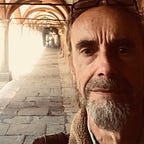The Gift of The Desert
I adjust to the slow swinging pace of the camels and take in their mix of gentle grace, their unique body shapes and their massive animal presence. I stare at the beauty of the shadows we cast on the sand; the unmistakable camel silhouettes, linked in a caravan of four by their looping rope halters. I hear the intermittent rumbling of a stomach, the grinding of teeth. I notice their sexy eyelashes and delicate lips. My pubic bone grinds on the cloth saddle of my camel, as he lurches me back and forth.
Dust and sand mist the air. We veil our faces with the free ends of our turbans; turning our faces away from the wind as it gusts from the east. I feel grit between my teeth.
The mother dune rises high above us, her orange sand muted in the misty light, as the evening draws in. The soft shapes and curves of the hillocks and valleys interlock and swirl around each other with an aesthetic that manmade shapes could never emulate. Nature’s beauty shines here, timeless in these shifting piles of sand.
Dusk and then dark arrives, as we approach our tented camp. Distant drums beat an African rhythm from a nearby bivouac, creating an aural backdrop to the tranquil scene that awaits us, like a syncopated heartbeat of the earth itself.
We drop into the shelter of our Berber tent, its brown woven camel hair stretched taut over crooked poles. We sip mint tea, sweet and restorative after the journey. Then we lie out on the warm sand staring up at a big sky peppered with stars, as the wind sighs around the tents, sending flurries of sand into our faces to remind us where we are. Dry air, warm wind, smarting nostrils, gritty eyes, bodies surrendered to the earth.
There are conversations about nomadic life, timeless knowledge, the constant search for water and food for the goats and camels. We are served vegetable tagine and reflect on this tiny taste of another way to live, increasingly jostled and tainted by the modern materialist ways and needs we rely on. Yet the nomads are here, surviving, thriving, holding both worlds. There are four-by-fours and motorbikes alongside camels; weekly markets, cell phones and solar lighting. Jeans and sports shoes are accompanied by turbans of every colour — still the most practical headdress for the desert.
We are so disconnected, so out of touch with the simple life, that even one night in a nomad tent is a challenge for us; forcing us to consider all that we take for granted in our world.
We greet the dawn with wonder and by eight we are mounted and making our way back through the dunes, drinking in the silence and the peace in this orange sunlit sea of sand.
Gradually we become aware of engines in the distance; one or more motorised vehicles manoeuvring in the distant dunes. Suddenly a seriously customised car bursts over the hill in front of us, invading our senses in every way. Then we see an overweight man levelling a phallic telephoto lens towards the car. As we approach him, it dawns on us that we are walking through the middle of a car rally. Our moroccan guide shouts ‘Fuck You’! and raises his fist in defiance of this intrusion to our peace.
The man shouts back to reason with us; “But this is THE Libya Rally!” as if there could be noone on the planet that would fail to be impressed and excited to be involved, while showing his blindness to what we have come to the desert for.
The clash of polarities symbolised by these ultimate in ‘boys‘ toys‘, and our little caravan of camels, hits me with its poignancy in this moment, just as we had dropped into the essence of what we came to Morocco to experience. The camels become nervous, while I feel pain and confusion, as if caught in the crossfire on a battlefield.
And as we detour slowly around the rally base, with its massive entourage of support trucks, cameras sponsorship banners, and crowds of followers, my partner reminds us to bring love to the situation and I am suddenly filled with gratitude, as the significance of the moment sinks in.
Its a gift, that the very day that we decide to experience the desert, looking for a spiritual connection with the place and its people, has coincided with the one day in the year that the Libyan Rally came to this very spot on the planet, with all its noise and razamataz. It has shown me in such graphic terms the clash of two worlds. The paradox that I and so many others are living with.
I touch into the part of me who could enjoy an opportunity to feel part of this disconnected, frenetic, technically addicted world, and then move into that bigger part of me who has always been there in the shadow of patriarchy, deeply connected, nature-based, timeless, grounded and still.
Our little group weaves its way to safety. the rhythm of my camel’s stride rocks and soothes my churning emotions. I sit with my dilemmas; how to integrate and live my soul’s journey? How to dance a new paradigm while surrounded by the old? How to give my life meaning and purpose? And how to help others looking for healing and restorative means to deal with the split and disconnection that we are all suffering in the loss of what these berber nomads embody so well? This is the challenge. This is my work. The work we are starting to do in Italy.
